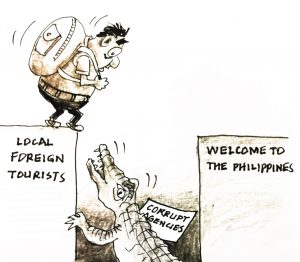The recent report ranking Manila as the fifth most unsafe city for tourists is distressing proof of the rampant corruption and exploitation that visitors face. From the moment targeted tourists arrive at the airport, they are ensnared in a web of deceit and extortion by various agencies, including airport management, the Bureau of Customs, and the immigration office, the very entities that are supposed to facilitate a smooth travel experience.
Instead of facilitating complex procedures, they create unnecessary obstacles, compelling travelers to pay bribes to navigate fabricated issues. This widespread corruption not only mars the initial impression of Manila but also sets a tone of mistrust and fear for the rest of their stay. Upon arrival, tourists frequently encounter corrupt officials who concoct problems to extort money. Common practices include falsely claiming that carry-on luggage must be checked in for a hefty fee, which can be avoided by paying a bribe directly to the officials. This form of extortion, starting at the entry point, makes travelers feel vulnerable and unwelcome. Such unscrupulous behavior at the airport, a primary gateway to the country, highlights the severity of corruption and its detrimental impact on tourism.
The corruption extends beyond airport officials to baggage handlers who demand exorbitant fees for their services. These individuals often employ bodyguards to intimidate tourists who refuse to pay, creating a hostile and frightening environment. This aggressive exploitation further drains tourists of their money and peace of mind, reinforcing a sense of insecurity. The pervasive nature of this corruption indicates a systemic problem that requires urgent and comprehensive reforms within airport management and related services.
Once outside the airport, the exploitation continues with taxi drivers who charge exorbitant fares, exploiting the tourists’ unfamiliarity with local rates. This issue is compounded by the presence of swindlers, snatchers, and hold-uppers who roam the city and other parts of the country, posing significant threats to the safety and well-being of tourists. The constant threat of being overcharged, robbed, or otherwise harmed creates a distressing experience for visitors, deterring tourism and damaging the country’s reputation on a global scale.
The government must take decisive action against corruption within these agencies. Regular monitoring, strict penalties, and legal action against corrupt individuals are essential steps to restore confidence in Manila and other cities as tourist destinations.
Furthermore, law enforcement should actively target and dismantle criminal syndicates that prey on tourists. They should implement stringent measures and showcase a commitment to protecting visitors. The government can repair the country’s tarnished image and ensure a safer, more welcoming environment for all travelers.




